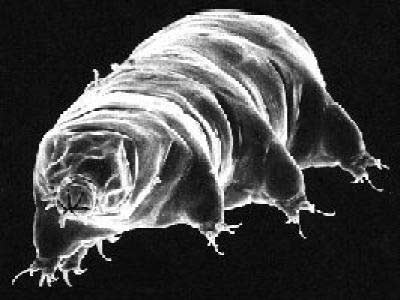Unprotected creatures still survive in the universe
There is a small 6-foot creature with the ability to pause all biological activities in a harsh environment to survive after a trip to space. It is also capable of instantly destroying almost all life forms, including humans.
For the first time, researchers have experimented with a large resistant bioreactor called "sea bear" . They exposed them to the harsh vacuum environment of the universe with deadly radiation on a spacecraft in the orbit of the Earth. Many of them still exist.
Sea bears, often called tardigrade, are likely similar to sea shrimp (also known as 'sea monkeys' ). They are known for resurrection after being transported to different homes by mail order. Tardigrade is about the size of a small spot, less than 1.5 mm long. They live on wet lichens and moss, but when the environment is dry they will wait until the water comes back. They also withstand heat, cold and radiation.
Their radiation resistance is the most surprising thing for scientists.

Long-lived tardigrade (also called 'sea bear').(Photo: Rick Gillis and Roger J. Haro, Department of Biology, University of Wisconsin - La Crosse)
They took the tardigrade to the FOTON-M3 spacecraft launched by the European Space Agency (ESA) in September 2007. They must be exposed to space conditions and then be checked again after returning to Earth. .
Most tardigrade species survive even in a vacuum environment where there are many cosmic rays, some of them even survive in environments with high levels of ultraviolet radiation from the Sun. deadly (higher at the Earth's surface 1,000 times).
According to Cell Press, survivors can still "reproduce well after a space trip."
The researchers wrote: the way that the tardigrade returned from the trip can still survive and reproduce 'remains a mystery'.
Ultraviolet light contains high-energy light particles that cause serious damage to living tissue, you can clearly feel when sunburned. But more than that, ultraviolet rays can damage the genetic material of cells that cause diseases like skin cancer. Radiation in the universe is also thought to be bactericidal.
The study was conducted under the direction of K. Ingemar Jonsson of Kristianstad University, Sweden.
- Strange creatures do not have both anus and anus, but survive for over 500 million years
- Detecting concussions about 20 species of strange creatures in Antarctica
- Put your mouse on the universe to help us learn about how to survive on Mars
- America does not hide information about alien creatures
- The benefits are endless from whale carcasses
- Apart from cockroaches, which creatures can lose their heads and still survive?
- Sand creatures
- If the plane falls into the sea, how do passengers survive?
- Goldfish survive more than 4 months without eating
- Discovering strange sea creatures suspected of being aliens in America
- Can aliens look more like fish than humans?
- 10 most terrifying sea creatures
 Why do potatoes have eyes?
Why do potatoes have eyes? 'Tragedy' the world's largest carnivorous life: Death becomes ... public toilet
'Tragedy' the world's largest carnivorous life: Death becomes ... public toilet Tomatoes were once considered 'poisonous' for 200 years
Tomatoes were once considered 'poisonous' for 200 years Detecting microscopic parasites on human face
Detecting microscopic parasites on human face